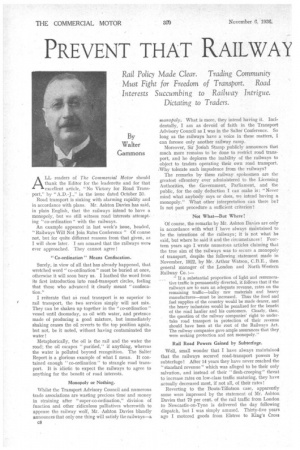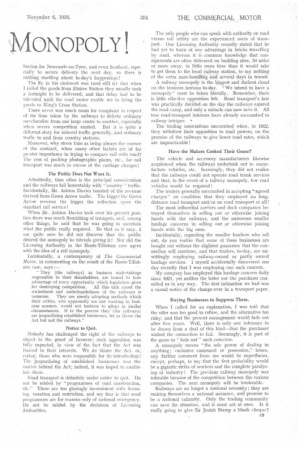PREVENT THAT RAILWAY MONOPOLY I
Page 46

Page 47

If you've noticed an error in this article please click here to report it so we can fix it.
By Walter Gammons
ALL readers of The Commercial Motor should thank the Editor for the leaderette and for that excellent article, "No Victory for Road Transport," by "A.D.-J.," in the issue dated October 30.
Road transport is sinking with alarming rapidity and in accordance with plans. Mr. Ashton Davies has said, in plain English, that the railways intend to have a monopoly, but we still witness road interests attempting "co-ordination" with the railways.
An example appeared in last week's issue, headed, "Railways Will Not Join Rates Conference" Of course not, but for quite different reasons from that given, as I will show later. I am amazed that the railways weru ever approached. They cannot agree !
"Co-ordination " Means Confiscation.
Surely, in view of all that has already happened, that wretched word "co-ordination" must be buried at once, otherwise it will soon bury us. I loathed the word from its first introduction into road-transport circles, feeling that those who advanced it clearly meant "confiscation."
I reiterate that as road transport is so superior to rail transport, the two services simply will not mix. They can be shaken up together in the " co-ordination " vessel until doomsday, as oil with water, and pretence made of producing a good mixture, but immediately shaking ceases the oil reverts to the top position again, but not, be it noted, without having contaminated the water !
Metaphorically, the oil is the rail and the water the road; the oil escapes "purified," if anything, whereas the water is polluted beyond recognition. The Salter Report is a glorious example of what I mean. It contained enough " co-ordination " to strangle road transport. It is idiotic to expect the railways to agree to anything for the benefit of road interests.
Monopoly or Nothing.
Whilst the Transport Advisory Council and numerous trade associations are wasting precious time and money in straining after "super-co-ordination," division of function and other ridiculous palliatives wherewith to appease the railway wolf, Mr. Ashton Davies blandly announces that only one thing will satisfy the railways—a CS
morropo/y. What is more, they intend having it. Incidentally, I am as devoid of faith in the Transport Advisory Council as I was in the Salter Conference. So long as the railways have a voice in these matters, I can foresee only another railway ramp.
Moreover, Sir Josiah Stamp publicly announces that much more remains to be done to restrict road transport, and he deplores the inability of the railways to object to traders operating their own road transport. ,Why tolerate such impudence from the railways?
The remarks by these railway spokesmen are the greatest effrontery ever administered to the Licensing Authorities, the Government, Parliament, and the public, for the only deduction I can make is: "Never mind what anybody says or does, we intend having a monopoly." What other interpretation can there be? Is not past procedure a sufficient criterion?
Not What—But Where!
Of course, the remarks by Mr. Ashton Davies are only in accordance with what I have always maintained to be the intentions of the railways; it is not what he said, but where he said it and the circumstances ! Fourteen years ago I wrote numerous articles claiming that the true aim of the railways was to secure a monopoly of transport, despite the following statement made in November, 1922, by Mr. Arthur Watson, C.B.E., then general manager of the London and North-Western Railway Co. :—
-"If If a substantial proportion of light and remunerative traffic is permanently diverted, it follows that if the railways are to earn an adequate revenue, rates on the remaining traffic—bulky raw materials and heavy manufactures—must be increased. Thus the food and fuel supplies of the country would be made dearer, and the heavy industries would he penalized for the benefit of the road haulier and his customers, Clearly, then, the question of the railway companies' right to undertake road transport in protection of their revenue should have been at the root of the Railways Act. The railway companies gave ample assurances that they were seeking protection and not monopoly."
Rail Road Powers Gained by Subterfuge.
Well, small wonder that I have always maintained that the railways secured road-transport powers by subterfuge! After 14 years they have never reached the "standard revenue" which was alleged to be their only salvation, and instead of their " flesh-creeping " threat to increase rates on low-class traffic maturing, they have actually decreased most, if not all, of their rates !
Reverting to the Bouts-Tillotson case, apparently some were impressed by the statement of Mr. Ashton Davies that 79 per cent, of the rail traffic from London to Newcastle-on-Tyne is delivered the day following dispatch, but I was simply amused. Thirty-five years ago I motored goods from Elstree to King's Cross Station for Newcastle-on-Tyne, and even Scotland, especially to secure delivery the next day, so there is nothing startling about to-day's happenings !
The fly in the ointment was (and still is) that when I railed the goods from Elstree Station they usually took a fortnight to be delivered, and that delay had to be tolerated until the road motor enable me to bring the goods to King's Cross Station.
There never was much room for complaint in respect of the time taken by the railways to deliver ordinary merchandise from one large centre to another, especially when severe competition existed. But it is quit6 a different story for mineral traffic generally, and ordinary traffic to and from country stations.
Moreover, why stress time as being always the essence of the contract, when many other factors are of far greater importance in trying to compare rail with road? The cost of. packing photographic plates, etc., for rail transport was much in excess of the carriage charges !
The Public Does Not Want It.
Admittedly, time often is the principal consideration and the railways fail lamentably with "country traffiC. Incidentally, Mr. Ashton Davies boasted of the revenue derived from Green Arrow traffic. The bigger the Green Arrow revenue the bigger the reflection upon the standard rail service!
When Mr. Ashton Davies took over his present position there was much flourishing of trumpets, and, among other things, he said that he was going to ascertain what the public really required. Be that as it may, I am quite sure be did not discover that the public desired the monopoly he inten#s giving it! Nor did the Licensing Authority in the Bouts-Tillotson case agree with the idea of a rail monopoly.
Incidentally, a contemporary of The Commercial Motor, in commenting on the result of the Bouts-Tillotson case, says:— • " They (the railways) as business undertakings responsible to their shareholders, are bound to take advantage of every opportunity which legislation gives for destroying competition. All this talk about the wickedness and underhandedness of the railways is nonsense. They are merely adopting methods which their critics, who apparently are not wanting in business acumen, would not hesitate to adopt in similar. circumstances. If in the process they' (the railways) are jeopardizing established businesses, let us blame the Act hut not the railways."
Notice to Quit.
Nobody has challenged the right of the railways to object to the grant of licences; such opposition was fully expected, in view of the fact that the Act was framed in their interests. We do blame the Act, or, rather, those who were responsible for its introduction! The jeopardizing of established, businesses was the motive behind the Act ; indeed, it was hoped to annihilate them.
Road transport is definitely under notice to quit. Do not be misled by "programmes of road construction, etc." These are too glaringly inconsistent with licensing, taxation and restriction, and my fear is that road programmes are for reasons only of national emergency. Do not be misled by the decisions of Licensing Authorities. The only people who can speak with authority on road versus rail utility are the experienced users of transport. One Licensing Authority recently stated that he had yet to learn of any advantage in bricks travelling by road, whereas it iS common knowledge that consignments are often delivered_ on building sites, 50 miles or more away, in little more time than it would take to get them to the local railway station, to say nOthing of the extra man handling and seVeral days in transit.
A railway monopoly is the biggest and darkest Cloud on the business-horizon to-day. "We intend to have • monopoly" must be taken literally. Remember, there is little effective opposition left. Road transport's fate waS practically decided on the day the railways entered the road camp, and onlY a miracle can now save it. All true road-transport interests have already succumbed to railway intrigue. • The trading associations succumbed when, in 1922, they withdrew their opposition to road powers, on the promise of the railways to give lower road rates, which are impracticable !
Have the Makers Cooked Their Goose?
The vehicle and accessory manufacturers likewise acquiesced when the railways undertoek not to manufacture vehicles, etc. Seemingly, they did not realize that the railways could not operate road trunk services and that, in the event of a railway monopoly, few road vehicles would be required!
The traders generally succumbed in accepting "agreed charges" on condition that they employed no longdistance road transport and/or no road transport at all!
The most influential carriers and dock companies betrayed themselves in selling out or otherwise joining hands with the railways, and the numerous smaller haulage concerns in selling out or otherwise joining hands with the big ones.
Incidentally, regarding the smaller hauliers who sell out, do you realize that some of these businesses are bought out without the slightest guarantee that the connection will continue, and that traders, to-day, are unwittingly employing railway-owned or partly owned haulage services. I myself accidentally discovered one day recently that I was employing one such concern.
My company has employed this haulage concern daily since 1021, yet neither the latter nor the purchaser consulted us in any way. The first intimation we had was a casual notice of the change-over in a transport paper.
Buying Businesses to Suppress Them.
When I called for an explanation, I was told that the offer was too good to refuse, and the alternative too risky, and that the present management would fade out after five years. Well, there is only one inference to be drawn from a deal of this kind—that the purchaser wished the connection to fail. Seemingly, it is part of the game to "fade out" such concerns.
A monopoly means "the sole power of dealing in anything ; exclusive command or possession," hence, any further comment from me would be superfluous, eicept, perhaps, to say that the first probability would be a gigantic strike of workers and the complete paralysing of industry! The previous railway monopoly was tolerable because of the competition between the various companies. The next monopoly will be intolerable.
Railways are no longer a national necessity; they are making.themsolves a national nuisance, and promise to be a national calamity. Only the trading community can save the situation, and it must act at once. Is it really going to give Sir Josiah Stamp a blank cheque?












































































































